
views
The sudden surge in cases of Omicron across Delhi has left the govt and authorities greatly worried. The national capital today added 25 cases to its tally of the new heavily-mutated omicron variant, staying ahead of Maharashtra for the second day in a row.
Commenting on the current virus situation, Health Minister Satyendar Jain on Thursday said that the Omicron variant is being detected in patients with no travel history indicating a gradual spread in the community, adding that the variant has been found in 46 percent of 115 samples sequenced so far.
“Indeed, the variant is gradually spreading in the community and its proportion will increase in the coming days,” the health minister was quoted saying when asked if Omicron will be the dominant variant in a possible third wave of the pandemic.
While the authorities continue to struggle in containing Omicron spread, a potent question that comes to mind is what is community spread and how can it affect the people.
What is a community spread?
Community spread is a phenomenon whereby the SARS-CoV-2 spreads from person to person through droplets, aerosols or through touch. As already witnessed at the time of Covid first and second wave, a plausible way to track the extent of a virus spread is through contact tracing.
Contact tracing is a process to track this chain of virus transmission and also to stop the chain from proceeding further by quarantining people who might have come into the chain. When the chain can not be established because the virus is widespread, then it leads to community spread. When this happens, it indicates that the virus is circulating in the community and anyone is open to getting infected.
How Fast is Omicron Spreading in Delhi?
As already established in various studies, Omicron is a more transmissible variant of SARS-CoV-2, more contagious than Delta which caused the second wave of the pandemic in India. The capital has recorded 263 cases of omicron variant since it was first detected in the country in early December, which is the highest in the country. The city witnessed its daily tally almost doubling from a day ago with 923 new cases reported on Wednesday.
The community spread of this variant of covid was confirmed by Delhi health minister Satyendar Jain on Thursday who revealed that the latest genome sequencing report of samples in Delhi showed 46% of the samples have Omicron including those who do not have any travel history which is indicative of the variant rapidly spreading within the community. Delhi hospitals have 200 Covid patients of which 102 belong to the city, the minister further added.
In the earlier stages of detection, the cases of Omicron in India were foreign travellers who contracted the variant, first detected in South Africa, from abroad. All first cases of Delhi, Gujarat, Maharashtra, Karnataka were international travellers. However, the situation changed within a month as now the Omicron cases are mostly those with no international travel history. Earlier, the World Health Organization had confirmed the community transmission of Omicron in South Africa and the UK.
Yellow Alert in Delhi
A yellow alert was sounded in Delhi on Tuesday amid a surge in the city’s Covid cases and Omicron fear. The alert under the Graded Response Action Plan (GRAP) led to the imposition on restrictions in the national capital, which included the closing of schools, colleges, cinema halls, gyms and spas. Metro trains and buses are allowed to operate with 50% capacity.
Announcing the alert, Delhi Chief Minister Arvind Kejriwal had assured the city that the government is “10 times more prepared” than before to deal with the rise in Covid cases. He added that the latest Covid-19 cases were mild and there was no increase in the consumption of oxygen or the use of ventilators despite the rise in numbers.
The health minister also defended the stringent “yellow alert” in the national capital amid a spike in Covid-19 and Omicron cases, saying the need of the hour was to be precautious.
“Only Delhi has taken strict measures in the whole country. For those people who are saying too many restrictions have been put in Delhi, it is better to be precautious. Maximum international travellers come to Delhi. If the Centre had banned international flights earlier, Omicron would not have entered India,” the minister was quoted saying.
Read all the Latest India News here




















Comments
0 comment